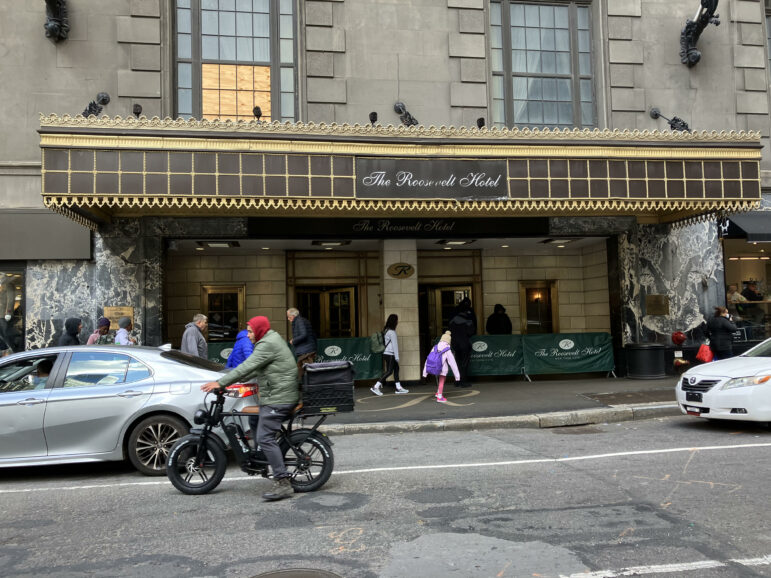
Opinion: How a Writing Program Helped Homeless New Yorkers
“When neighbors have the chance to connect across housing status, it makes all of us and our neighborhoods kinder and stronger. It allows us all to learn from each other and imagine a better world.”
Daniel Parra
The Roosevelt Hotel in Manhattan, which is being used by the city as an intake center for newly arrived immigrants in need of shelter.
CityViews are readers’ opinions, not those of City Limits. Add your voice today!
Meaningful relationships can start in unexpected places. For us, it was in a community room at a homeless shelter in Midtown Manhattan. One of us, Dayse, had been up and down the Americas in the past year, bouncing from place to place after arriving from Brazil. Her housing had been unstable and she landed in New York, not accounting for how challenging it is to experience homelessness.
She has no friends or acquaintances here—just kind donations and blessings from strangers and God. This past winter, she got really sick from carrying her bag on her back all the time. She nearly died from dermatomyositis, a rare disease that causes muscle weakness and skin rashes. She spent more time in hospitals than she’d like to remember. She wasn’t sleeping or eating properly due to her lack of stable housing.
So when she entered the shelter one day, she was thrilled to meet Susan, a longtime writing instructor and midtown resident. As an aspiring screenwriter, she felt a warm relief wash over her.
Susan noticed that many of her neighbors were experiencing homelessness, and wanted to get to know them better. She joined the Open Hearts Initiative’s Midtown chapter to use her skills and resources to welcome and support her neighbors, and she started facilitating a writing workshop at a low-barrier transitional housing facility in her neighborhood, where Dayse was living.
In addition to Dayse and Susan (the co-authors of this piece), the workshop participants included other Open Hearts volunteers, and residents and staff of the shelter. Throughout the spring and into the late summer, they would meet for hour-long sessions while snacking on mint Milano cookies to write and share their work with each other. Although Susan brought in writing prompts and poems as model texts, participants were encouraged to write about whatever subject they wanted and in any format. Poems, letters, lists, essays, songs, whatever felt right.
They wrote about their favorite seasons and food and television shows, about their favorite people and places and music and what New York City sidewalks smell like on hot, humid July days. They wrote about who and what was in their hearts and letters to their emotions (for example, Susan wrote a letter to her anxiety). They wrote lists of things they had done that day, about hopes for the future and memories from the past.
They read poems out loud together by Maya Angelou, Ada Limon, Mary Oliver, Nikki Giovanni, Alberto Rios, Ariel Francisco, Renee Watson and Gwendolyn Brooks. They made drawings and decorated their writing to close out the workshops, which Susan included because usually people find art-making a relaxing and enjoyable way to end writing sessions. The only “rule” was respect for one another, and to listen to each other when we read our work out loud, without any judgment or follow up questions.
Programming that brings together housed and unhoused neighbors provides meaningful benefits for everyone involved. In one study of a community running program in the United Kingdom, researchers found that “all of the [participants] interviewed reported social benefits of being part of a group.” They found a sense of connectedness and support during difficult times. That’s why programs like this writing workshop are key to helping those in shelter get the kind of social support that everyone needs and deserves. It helps them grow creatively and also provides a safe, fun outlet for those who are going through major transitions.
Writing also is healing. It reduces stress and anxiety, and provides a coping method for the often strenuous pressure from the outside world. According to the American Psychological Association, writing about negative experiences can help a person overcome them. Writing poems and lists and letters at the workshops gave Susan a new perspective and specific information about what day to day life is like in a New York City transitional housing facility, about the challenges and frustrations and profound lack of respect that the participants faced on a regular basis.
It gave Susan a front row seat to how under-resourced the whole system is. It underscored the fact that way more funding is needed for the organizations and facilities that are struggling to provide basic services to unhoused New Yorkers and, now, newly-arrived migrants. Lawmakers must consider this, instead of vowing to slash migrant funding.
When neighbors have the chance to connect across housing status, it makes all of us and our neighborhoods kinder and stronger. It allows us all to learn from each other and imagine a better world. Every one of us has something to offer in building a city where everyone feels welcome.
We all deserve a chance to write our next chapters.
Dayse da Cunha is from Brazil and Susan Buttenwieser is a writer and member of Open Hearts Initiative Midtown.
The post Opinion: How a Writing Program Helped Homeless New Yorkers appeared first on City Limits.

